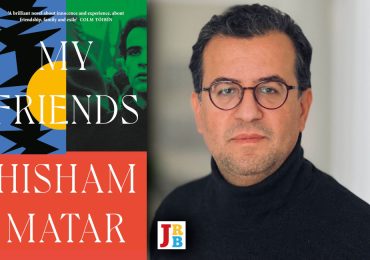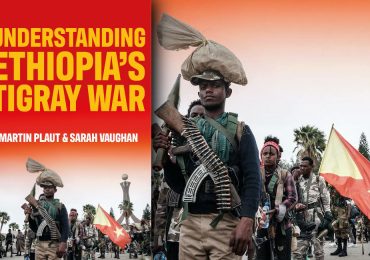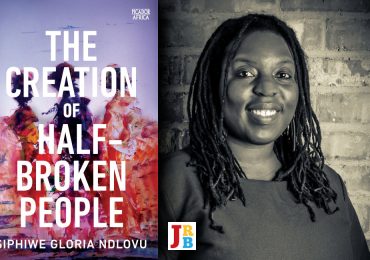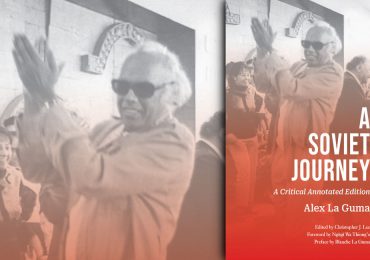George Hull reviews Against Decolonisation: Taking African Agency Seriously by Olúfẹ́mi Táíwò.

Against Decolonisation: Taking African Agency Seriously
Olúfẹ́mi Táíwò
Hurst & Co., 2022
The prevailing view of colonialism, writes Professor Olúfẹ́mi Táíwò of Cornell University in his new book Against Decolonisation: Taking African Agency Seriously, ‘is necessarily and justifiably negative’. Centuries of Arab and European conquests established illegitimate governmental regimes over much of Africa. Backed by military force from overseas, these regimes denied political and economic self-determination to local people. Colonial rulers fostered racist ideologies to smooth the path of political domination and economic exploitation, doing great psychological harm—concomitant with rationalised physical harm—to African people in the process. In the worst instances, ‘colonisers convinced themselves that the colonised were not merely inferior; they were not even human’.
In the second half of the twentieth century, Africa’s ‘first struggle for freedom’ wrest and constituted self-governing states. But ex-colonisers did not thereby lose all influence, for leading powers like Britain and France still used the levers of global trade and finance to adjust the costs and benefits associated with policy options available to the newly independent states. Táíwò agrees with Ghana’s first president, Dr Kwame Nkrumah, that this ‘neocolonialism’ was a serious obstacle.[1] But he cautions against equating neocolonialism with colonialism, as pathways were open for the post-independence states, especially if acting in concert, to pursue their interests. Taking African agency seriously entails attributing a fair bit of ‘neocolonialism’s success post-independence’ to unforced errors by office-bearers in African governments.
Besides neocolonialism, there lingers to this day in many African countries a bundle of assumptions about culture and ideas concerning authority and social organisation which was actively cultivated in the colonial era for the purpose of effective rule. Táíwò’s insights into the ideational legacy of colonialism are the highlight of Against Decolonisation.
He notes that much of that legacy is not to be found where currently fashionable notions and colonial-era prejudices equally might lead one to suppose. Colonial governments tended—in the words of Nigerian historian Professor JF Ade Ajayi—‘to ally with the most conservative elements in society’, especially ‘the submissive chiefs’; for ‘the main preoccupation of those régimes was not to carry out social reform but primarily to control and to maintain law and order so as to facilitate economic exploitation’.[2] Before British colonial rule began, influential members of West African educated elites had embraced liberal democracy as their favoured governmental model: the Fante Confederation of 1871 is the most striking example. This choice was facilitated by foreign travel, international trade networks and the longstanding presence of missionaries, all of which enabled local elites to understand and evaluate intellectual developments elsewhere in the world. In these cases, it is therefore incorrect to ‘attribute the emergence of ideas about liberal democracy to colonial regimes’. Táíwò rightly eschews an inflated conception of colonialism which would encompass all foreign contact, including commerce and peaceful proselytisation.
British colonial rule did not foster these liberal democratic political aspirations. It throttled them, suppressing the educated African elites with the help of a paid cadre of ‘traditional’ leaders: chiefs selected for subservience and legitimised by newly encoded ‘traditional’ laws, many of which had long been regarded as obsolete. In West Africa, the system of ‘indirect rule’ is associated with colonial administrator Lord Frederick Lugard. But Professor Mahmood Mamdani of Makerere University and Professor Lungisile Ntsebeza of the University of Cape Town have demonstrated that Lugard was merely consolidating the results of experiments in indirect rule conducted by rulers and administrators of colonies in Southern Africa: the Cecil Rhodes government in the Cape Colony, Sir Theophilus Shepstone in Natal. Wherever it was implemented, indirect rule short-circuited Africans’ political participation and ratcheted up their exploitability. Under indirect rule, the majority of African people could not own land (the chief disposed of land on a community’s behalf), they could not vote (the chief represented them as purported hereditary head of their ‘tribe’), they were prisoners of a ‘traditional’ legal system (overseen by the native commissioner), they might even be liable for compulsory labour (‘customary’ service to the chief).[3]
Though colonial rule in Africa was not uniform, one pervasive model relied upon what Táíwò aptly labels ‘sociocryonics’. Outdated ‘traditional’ customs and ideas about authority were frozen in place—when they were not simply invented—for purposes of control. What Táíwò calls ‘Africa’s second struggle for freedom’ is, in large part, a struggle against indirect rule’s legacy of outdated or invented ‘traditional’ values and ideas: against ‘child marriage, polygyny, caste systems, oppressive rule under native hierarchies denominated largely by chieftaincy, gender oppression’, ‘age-grade memberships that are not voluntarily chartered’. And it is a struggle in the name of precisely those liberal democratic values and ideas about governance which colonial administrations trampled until the very eve of their departure.
In what sense, then, is Táíwò against decolonisation? In its attempts to answer this question, Against Decolonisation ultimately disappoints.
Táíwò distinguishes ‘decolonisation1’, of which he is in favour, from ‘decolonisation2’, which he is against. Decolonisation1 stands for ‘making a colony into a self-governing entity with its political and economic fortunes under its own direction’ (i.e., the first struggle for freedom); decolonisation2 stands for the imperative that a postcolonial society rid itself of colonial rule’s objectionable cultural and ideational residue.
One might have thought that Táíwò’s second struggle for freedom—the struggle against, among other things, the constricting legacy of colonial-era sociocryonics—is an object lesson in decolonisation2, and thus that the author would be cheering on both forms of decolonisation. However, he chooses to define decolonisation2 as requiring ‘an ex-colony to forswear, on pain of being forever under the yoke of colonisation, any and every cultural, political, intellectual, social and linguistic artefact, idea, process, institution and practice that retains even the slightest whiff of the colonial past’.
Certainly, this rigoristic conception rules out Táíwò’s own more moderate approach which, while condemning sociocryonics, acknowledges both that many positive ideas, values and practices existed during (though not because of) colonial rule, and that the cultural and ideational legacy of colonial rule itself is not only negative. But it also rules out the approach to intellectual decolonisation championed by Against Decolonisation’s principal antagonist. Stressing that ‘the fundamental framework of the book’ is ‘philosophy’, the author selects as his primary decolonising interlocutor the Ghanaian philosopher Professor Kwasi Wiredu, who died in January 2022.
Agreeing with Táíwò that colonial rule had a distortive impact on ideas and cultural values in many parts of Africa, Wiredu advanced a ‘conceptual decolonisation’ agenda in philosophy. This agenda amounts to an intellectual audit of all theories whose development was significantly influenced by colonialism’s religious, political or linguistic impositions. Where precolonial notions are found to have been supplanted, an informed theoretical choice has to be made between these notions and those which supplanted them, on ‘independent grounds’. For example, Wiredu found an updated version of a precolonial consensus model of governance to be superior to multiparty majoritarian democracy, on the independent ground that only the former respects ‘the fundamental human right of decisional representation’.[4] Multilingualism is a boon to the ‘conceptual decolonisation’ agenda: not because of an implausibly strong equation of language with cultural identity—a flaw the author rightly detects in Kenyan novelist Professor Ngũgĩ wa Thiong’o’s approach to decolonisation[5]—but because universal philosophical truths ought to be expressible in all languages. Specifically, Wiredu argued that articulating the correspondence theory of truth in his first language, Akan, can alert us to its foundation in tautology.[6]
So Wiredu’s version of intellectual decolonisation does not assume that ‘the alienness of an idea or practice, by itself’, is ‘a disqualifying attribute’, or that African thinkers cannot ‘domesticate a foreign idiom’, or that ‘political modernity’ is an ‘unmitigated failure’: the views Táíwò so laments in ‘our decolonisers’. As the author himself grants, on Wiredu’s ‘version of decolonising’, it ‘does not matter where an idea comes from as long as it is put through our critical wringers before we adopt it’.
Perceiving, from time to time, that his prime example of a decolonisation2 advocate subscribes to nothing remotely resembling his own definition of decolonisation2, Táíwò hedges and backtracks. He recommends ‘heeding Wiredu’s wisdom’. Perhaps ‘the problem is less with’ the ‘pioneers and trailblazers’ (including Wiredu) ‘and more with their imitators’. In that case, it would have made more sense for him to defend Wiredu’s conceptual decolonisation agenda—an approach to intellectual decolonisation which is neither decolonisation1 nor decolonisation2, and into which Táíwò’s own critique of sociocryonics slots quite neatly—against the ‘imitators’. By insisting on ‘the fruitlessness of extending the scope of decolonisation beyond its original meaning’ (i.e., decolonisation1), the author needlessly blocks off that path, however, and leaves himself with no option but to oppose Wiredu’s approach.
Is decolonisation2, as per the author’s rigoristic definition, simply a straw man? By no means. There is a school of thought on intellectual decolonisation that equates colonialism with modernity and modernity with the West, advocates ‘repudiation of universalism’, holds that any decolonisation without a radical ‘disengaging and delinking from Western epistemology’[7] is incomplete, does not shrink from dangerously ‘essentialist characterisations of cultures’, and happily attributes ‘problematic colonial consciousness’[8] to African thinkers who, employing their agency, ‘roam the entire human landscape for usable ideas’—i.e., everything Wiredu’s approach does not do. This is the ‘decoloniality’ school, which includes Professor Walter D Mignolo of Duke University and Professor Sabelo J Ndlovu-Gatsheni of the University of Bayreuth. The latter has assiduously applied ‘decoloniality’ theory to African history and current affairs.
Táíwò’s official line is that he is addressing ‘decolonisation’ and has ‘refrained from addressing the different concept of “decoloniality”’. But the decoloniality school positively haunts his book. Ndlovu-Gatsheni’s name, banished from the main text, crops up in the endnotes, where the author takes a series of quick swipes at him, decoloniality in general, and its fellow travellers. Ndlovu-Gatsheni, it turns out, has in the past quoted Táíwò out of context and labelled him as ‘enchanted with Euromodernity’;[9] in exchange, the latter now credits Ndlovu-Gatsheni (a little unfairly) with the view ‘that there is no qualitative difference between colonial Africa and independent Africa’. Small wonder, then, that his engagement of Wiredu sometimes calls to mind Mr Ryder at table, chiding his son Charles for the many sins of his cousin Melchior.[10]
If he had brought the decoloniality school out of the endnotes and into the main text, squarely rebutting its many faulty claims, the author might have recognised the late Wiredu for what he is: an ally. Tacitly, Táíwò’s book contains an original and valuable approach to intellectual decolonisation. This approach follows the conceptual decolonisation agenda in its universalism and its insistence on independent grounds, but departs from Wiredu in emphasising that not only ideologies and concepts from overseas, but perhaps above all some of the ‘traditional’ African cultural notions and practices, distorted, frozen in time, even invented by colonial administrators in situ, are colonial relics worthy of being discarded.
But Táíwò cannot make this version of intellectual decolonisation explicit. For the book as it is misattributes flaws of the decoloniality school to Wiredu and other moderates and, what is more, declares that all conceptions of decolonisation encompassing more than political independence stand or fall together. In so doing, despite its insights, Against Decolonisation further muddies the already muddy waters of academic discourse about decolonisation.
~~~
- George Hull is a researcher on social cohesion in the Poverty and Inequality Initiative and lecturer in the Philosophy Department at the University of Cape Town. He is editor of and contributor to The Equal Society: Essays on Equality in Theory and Practice (2015). He has published articles on ethics, social philosophy, philosophy of race and aesthetics in Philosophia, the Journal of Applied Philosophy, Philosophical Papers and the Philosophical Quarterly. He has written for The Economist, the Times Literary Supplement, The London Magazine, The Spectator, The Conversation (Africa), the Mail and Guardian, Total Politics and Left Foot Forward, among others. His play Peter was staged at the Camden Fringe Festival in London in August 2011.
[1] See Nkrumah, Neo-Colonialism: The Last Stage of Imperialism, London: Panaf Books, 1965.
[2] Ajayi, Tradition and Change in Africa: The Essays of J. F. Ade Ajayi (ed. T. Falola), Trenton: Africa World Press, 2000, p. 171.
[3] See Mamdani, Citizen and Subject: Contemporary Africa and the Legacy of Late Colonialism, Princeton: Princeton University Press, 1996; Ntsebeza, Democracy Compromised: Chiefs and the Politics of the Land in South Africa, Leiden: Brill, 2005.
[4] Wiredu, Cultural Universals and Particulars: An African Perspective, Bloomington: Indiana University Press, 1996, pp. 138, 180.
[5] See Ngũgĩ wa Thiong’o, Decolonising the Mind: The Politics of Language in African Literature, London: James Currey, 1986.
[6] See Wiredu, ‘Truth and an African Language’, in African Philosophy: New and Traditional Perspectives (ed. L. Brown), Oxford: Oxford University Press, 2004, pp. 35–50.
[7] Mignolo, The Darker Side of Western Modernity: Global Futures, Decolonial Options. Durham: Duke University Press, 2011, p. xxv.
[8] Ndlovu-Gatsheni, Decolonization, Development and Knowledge in Africa: Turning Over a New Leaf, London: Routledge, 2020, p. 8.
[9] Op. cit., p. 3.
[10] See Waugh, Brideshead Revisited: The Sacred and Profane Memories of Captain Charles Ryder, New York: Alfred A. Knopf, 1993.





